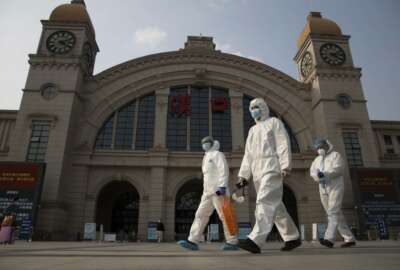
Hubbard Radio Washington DC, LLC. All rights reserved. This website is not intended for users located within the European Economic Area.
Hubbard Radio Washington DC, LLC. All rights reserved. This website is not intended for users located within the European Economic Area.
The Intelligence Community by many accounts was on to the possibility of a pandemic like this one for a long time.
Best listening experience is on Chrome, Firefox or Safari. Subscribe to Federal Drive’s daily audio interviews on Apple Podcasts or PodcastOne.
The Intelligence Community by many accounts was on to the possibility of a pandemic like this one for a long time. Well, now that it’s here, what effect might the pandemic be having on the intelligence community itself? For an assessment, Federal Drive with Tom Temin turned to Martijn Rasser, the senior fellow for technology and national security at the Center for a New American Security.
Interview transcript:
Tom Temin: Mr. Rasser, good to have you on.
Martijn Rasser: Great to be here, Tom. Thank you.
Tom Temin: Alright, so you served some time in the IC yourself. And to the extent that you can legally tell us, what do continuity of operations tend to look like in the intelligence components?
Martijn Rasser: Well, they’re quite robust. Particularly in the wake of 9/11, there was a lot of contingency planning that was put into place. And, you know, I’ve very high confidence that both my former colleagues at CIA as well as throughout the intelligence community are very well placed to continue doing all the important work that they do. So you have to remember, you know, the intelligence community is 24/7 operation so They’re used to operating at full speed at any given point in the day. And there’s some interesting things that you can do, because they’re already set up to do that. So you can have staggered work hours, shifts throughout the 24-hour period, and you can rotate parts of your staff in and out. So you can still have people in all the facilities while still observing important social distancing.
Tom Temin: In other words, you can have shifts of low density of people. But at some point in the 24-hour cycle, everybody is in the office.
Martijn Rasser: Yeah, that’s exactly right. You would want enough people there to make sure you cover all the things that need to be covered. But because the health of the workforce is so important, you’ll want to keep people home at any given point so you can rotate them in and out as needed.
Tom Temin: And I imagine they must have maybe in place ahead of time, unlike some of the other agencies that are scrambling, the bandwidth for remote working in a state secure manner that must have been in place already?
Martijn Rasser: Well teleworking, all in all is difficult, of course, right, and because you’re dealing with classified information. There are ways to access the classified networks from remote locations but, by and large, you’ll still want people working in their normal offices in order to do the work properly.
Tom Temin: I mean, many years ago in the Defense Department, they had a standard called Tempest. And certain PCs were Tempest standard, and they were practically lockboxes from a cyber standpoint. Does that kind of thing still exist? Do you know?
Martijn Rasser: Yes, those capabilities still exist, but by and large the work that by colleagues at CIA would do for example you would want to do in a SCIF, and most people don’t have SCIFs in their homes so you would still want people to work in secure facilities.
Tom Temin: I remember, John Deutch found that out the hard way. Does the IC have remote SCIFs in the event that for some reason everybody could not go to a building. Suppose there was, I don’t know, a gas leak or something in a facility so that you could not have people rotating in and out? Because regular federal agencies don’t maintain that kind of thing.
Martijn Rasser: Yeah, I’ll just say that there are contingency plans for those types of scenarios.
Tom Temin: But no addresses and streets, huh?
Martijn Rasser: No, no, not today.
Tom Temin: And what about the people that are in the field? And I know, of course, the IC has people all over the world, in the field doing work of various types, and how can they work? Suppose they do work that takes them out of an office in some country, and that country has a lockdown – what happens then?
Martijn Rasser: Yes, so this situation poses a big dilemma for collectors of human intelligence, right? Because a lot of that is very much driven by developing rapport with your asset. But now in a lot of places around the world, yes, you can’t walk around the street and meet someone for coffee or do a drop or brush past. So that makes it challenging. But at the same time, intelligence officers are very resourceful, creative people. So I’m confident that they’re coming up with good ways to deal with the situation. And don’t forget also this crisis presents certain opportunities as well. Now you have so many people online conducting their business over platforms like Zoom, and WebEx. That opens up new opportunities as well for collecting interesting bits of information. So all in all, yes, I definitely think there are some challenges to the normal day to day types of collection efforts. But at the same time, I’m very confident that our intelligence professionals are dealing with this very well.
Tom Temin: We’re speaking with Martijn Rasser, he’s senior fellow at the Center for a New American Security. And what about business operations, say the accounting and CFO types of functions in these components that are not handling classified material? Maybe I guess, you could say financial information, impinges on it, but itself is not necessarily classified. Can they work remotely at all? Or are they part of that rotation in and out with everybody else?
Martijn Rasser: There may be some limited circumstances where working from home is feasible for those types of position. But still, by and large, that type of information is still considered sensitive, if not formally classified. So here again, yeah, you would have that type of rotating work schedule set up in place. I imagine it’s not too dissimilar to the situation that you would have in the event of a government shutdown, for example.
Tom Temin: So basically, the continuity of operations procedures or techniques are different from those of regular agencies in that it doesn’t involve mass telework, but rather separation of people in the context of the 24-hour cycle within the existing normal facilities?
Martijn Rasser: Right, absolutely. That’s one advantage that the intelligence community has is they’ve had to deal with situations like this before. So there was a very good plan in place to deal with this scenario exactly like this, perhaps not as extreme as the pandemic crisis that we’re facing. But in terms of functioning effectively, yes, the intelligence community is very well placed to deal with this.
Tom Temin: And you mentioned the people using Zoom that is not so much the IC people but people they’re spying on. I guess it sounds like what you said is that that gives, because of the inherent insecurities of those types of systems that everybody’s using for you know, having cocktail parties with friends, that it could be a new avenue for sniffing out intelligence.
Martijn Rasser: Absolutely. You just have to open up the newspaper to see how many articles there are talking about instances of roles ending up on corporate meetings, zoom bombing, things like that – just shows you how vulnerable these types of applications are. And it also underscores how important it is that our telecommunications networks are secure, resilient and robust. And that’s one reason why the U.S. government is so adamant that Chinese telecommunications firms are not part of our 5G networks and why we don’t want our allies and partners to do the same thing. Just underscores why you do not want untrusted vendors on your critical infrastructure.
Tom Temin: And speaking of vendors, how do contractors that are often side by side with federal counterparts, how are they handled in these situations?
Martijn Rasser: Contractors at the CIA, especially, but throughout the intelligence community are treated exactly like staff. So for people working side by side with government officials, they continue to do so. It becomes trickier for outside contractors, for example, if they’re doing independent work that’s classified. They’ll have to do that at their own facilities if they can, otherwise that work is put on hold. So for people not working directly in the intelligence community, yeah, there’s probably some financial hardship in the sense that contracts are either delayed, or that payment is put on hold just because the work can’t be performed.
Tom Temin: Yeah, but is it possible also for a contractor employee to be on the same rotation? Say, the person you work with is suddenly now midnight to 8 am instead of, you know, 9-5 or whatever it was? You as the contractor could also be on a similarly off schedule for the purposes of separation.
Martijn Rasser: Right, absolutely. Yeah so I would expect contract employees in the intelligence community to be put on the same type of rotating cycles, schedules that their staff employee counterparts are doing.
Tom Temin: And do the IC brass constantly touch up these plans and rehearse them and otherwise game them out?
Martijn Rasser: Yeah, absolutely. There’s regular planning for these types of scenarios that take place every year. And as this crisis itself unfolds, I’m sure they’re making the necessary adjustments to deal with the circumstances as they arise.
Tom Temin: Martijn Rasser is a senior fellow with the Center for a New American Security. Thanks so much for joining me.
Martijn Rasser: Great to be with you, Tom. Thank you.
Tom Temin: We’ll post this interview at www.FederalNewsNetwork.com/FederalDrive. Subscribe to the Federal Drive at Apple Podcasts or Podcastone.
Copyright © 2024 Federal News Network. All rights reserved. This website is not intended for users located within the European Economic Area.
Tom Temin is host of the Federal Drive and has been providing insight on federal technology and management issues for more than 30 years.
Follow @tteminWFED

